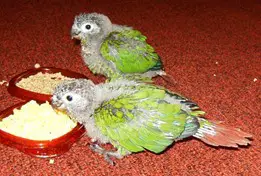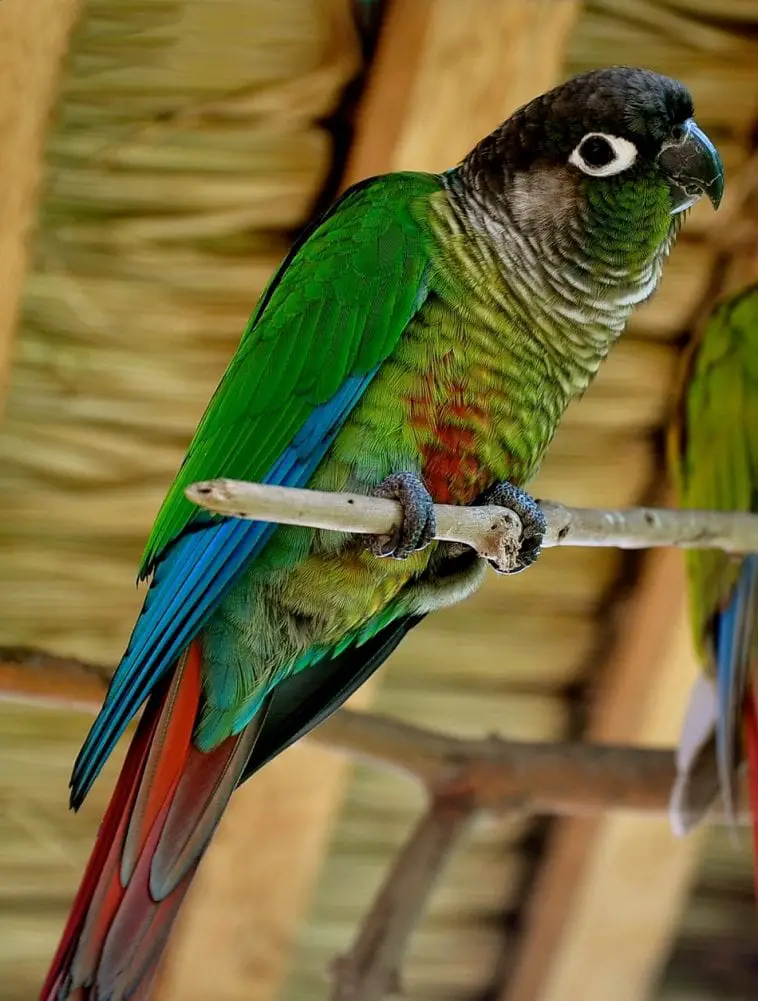Some homes simply don’t feel the same if you know something has changed. Maybe you need to move around some furniture, do a bit of redecorating, and if you live with a pet, check up on their living space in your home.
When it comes to Green Cheeked Conures, staying in a tight space can work, given that their needs are met. Although birds naturally make noise every so often, there may be certain times that they start screaming out of nowhere. To be clear, conures don’t actually scream for without reason at all and could be a sign that they need something. Here’s what is causing your conure to be a scream queen (or king) and what you can do about it.
Screaming Is Natural for Birds
Screaming is normal behavior among birds. It is a form of communication and can also signal times of the day like sunrise and sunset. Some birds scream as a way to exercise their vocal cords, like how a performer would prepare for an upcoming performance.
As a matter of fact, green cheeked conures are one of the quietest of the conure family, but screaming is a part of their nature like all other birds. Therefore, if your conure’s noise is still pretty manageable, it should be perfectly fine. If the noise has become inappropriate or excessive, it’s time that you pay close attention to what your pet needs as it may be a sign that it feels upset or stressed out.
Check on Your Conure’s Health and Diet
Your bird may be noisier lately if it is feeling under the weather. Pay a visit to your veterinarian to have it checked as the cries could be a symptom of a certain illness or condition. Try to check if it is eating enough too, and how frequent it eats. Otherwise, it may have a nutrient deficiency, which requires a change in its diet.

Don’t Leave them Bored and Lonesome
Another cause behind this troublesome squawking is that your conure is feeling bored or lonely. It may not be used for your absence during a certain time such as your working hours, or maybe it is tired of its current routine and needs some changing up in its daily life.
1. Answer Their calls
The screams could also just be calls to know if there’s a company around, including their owners, which also serves as their way of navigating fellow friends in the wild. Try answering them with a simple greeting or whistle. Do note that the bird could get used to screaming just to get your attention, so giving it a little more time together to talk and play can help tone it down.
Fellow owners on online forums dedicated to parents of all kinds of birds such as Reddit, Quora, and Avian Avenue suggest speaking to your conure with a low, friendly voice. It helps them develop their own friendly voice too instead of resorting to crying. Conures can learn to pick up a “friendly voice” when their owners speak to them in the same manner.
2. Make New Friends
Another bird for it to befriend could also work, but this usually depends on how your pet gets along with other birds. Others may end up fighting when paired or mixed with other birds.
3. Get Active
In fact, Conures are known to love staying active and prefer to play outside the cage. Try taking your buddy out of the cage or move the toys around by rearranging them from the inside. You can even try introducing new accessories that it would enjoy playing with.
Bonding with your conure and providing toys that stimulate activity is also vital to its health. You can try letting it out in a safe area of the apartment or maybe clear out some items when it’s playtime to make it more spacious.
Trigger Noises
Certain noises can also trigger the bird’s screaming. Observe if there are any particular sounds that the conure is not fond of and how you can eliminate these or maybe move the conure to an area where the noise is less audible.
Covering the cage with a light towel on the top or using a bird cage cover while the bird is resting can also help if these are common noises in the apartment like flushing the toilet, the doorbell ringing, or maybe a car alarm when set off. The scream could also express fear or danger. Birds have been helpful in cases of robbery when they don’t recognize a person who has entered the home, becoming a home security system.
Family, Friends, and Foes
Your bird might have also noticed there is something new about its family. Did somebody just recently move into your home? Has anybody left that your pet might have known for quite some time?
Try to observe if the bird has any particularly close friends (or foes) in the household. They could also feel depressed for a while. It should gradually get used to the loss or presence of a member. Cheer it up by playing together or involving the new member in activities with your conure.
They’re Just the Jealous Type
It could also be jealousy that agitates your bird if you have other pets that receive more attention, or maybe the poor conure does not get enough attention at all. Conures, in general, tend to be attention-seekers, so offering your time to play, chat, and feed them are the best ways to keep them happy.
Not Going to Bed on Time
The bird may also feel restless if it lacks sleep. Reasons, why birds are likely not to get enough rest, is because of too much light in a room, its cage being moved around often, living in a noisy environment, and people constantly moving around the home, which the bird can sense. Covering the cage and moving your conure to a more peaceful part of the apartment can help it catch some Zzzs.
Adulting
Going through “puberty” or as birds begin to mature, can also be the root cause of their screaming. Similar to a pubescent teen, birds can be hormonal as they start maturation or molting, and the screaming could just be a phase that they will grow out of eventually. Check-in regularly with your veterinarian as to when you can expect your bird to start transitioning to its adult phases.
Conclusion
Overall, birds will be birds, and yes, they also scream as people do. Each one has a unique personality that sets them apart from their brothers and sisters, but screaming is one trait that has always been with them as an owner; it is one’s responsibility to make sure your pet is healthy and happy at home. Small apartments can still be made comfortable for your green cheeked conure by giving them lots of love and proper care. Now you are now more familiar why green-cheeked conures scream, allowing you to take care of them better and avoid triggering such behavior.



